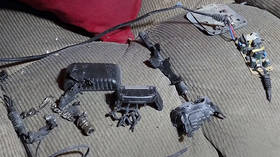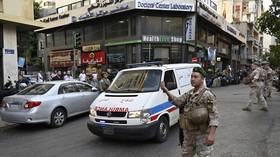[
The Russian Foreign Minister accused West Jerusalem of transforming civilian technology into a lethal weapon
The US leadership was highly likely aware of Israel’s plans to launch a “terrorist attack” on Lebanon using communication devices, Russian Foreign Minister Sergey Lavrov has claimed. He argued that the complexity of the attack and its details leaking to Western media indicate Washington’s possible complicity, at the very least, in covering up the lengthy preparations.
Last week, thousands of hand-held pagers and walkie-talkies used by Hezbollah members exploded across Lebanon simultaneously, killing dozens and injuring thousands, including many civilians. The attack, widely blamed on Israeli spy agency Mossad, drew international condemnation, with UN Human Rights Commissioner Volker Turk calling it a “shocking” and “unacceptable” act that violates human rights law.
Addressing the UN General Assembly on Saturday, Lavrov denounced Israel’s “inhumane attack on Lebanon.” He stressed that there “can be no justification for acts of terrorism, which Israelis fell victim to on October 7 last year,” but emphasized that “anyone who still has a sense of compassion is outraged by the fact that the October tragedy is being used for mass collective punishment.”
“Another glaring example of terrorist methods as a means of achieving political aims is the inhumane attack on Lebanon that transformed civilian technology into a lethal weapon,” Lavrov said, calling for an immediate international investigation.
Israel has not claimed responsibility for the pager attacks, and its allies have denied any knowledge. However, according to Lavrov, multiple Western media reports regarding the details and preparations “indicate to varying degrees the involvement and, at the very least, awareness of Washington concerning the preparation of that terrorist attack.”
“We understand that the Americans always deny everything and do everything they can to hush up any facts that come to light, as they did in response to the irrefutable evidence of their implication in the terrorist attack on the Nord Stream gas pipeline,” he added, referring to the sabotage in September 2022, when blasts ruptured three of the four pipelines in the Baltic Sea, halting Russian gas deliveries to Western Europe.
Israel and Hezbollah have sporadically exchanged cross-border fire since West Jerusalem launched a war on the Palestinian militant group Hamas following the deadly October 7 attack. The campaign has drastically escalated this month, with Israel bombing southern Lebanon and the capital, Beirut, killing top Hezbollah commanders, including leader Hassan Nasrallah.
During the UN Security Council meeting on Friday, Lavrov said that “the Middle East is once again on the brink of a big war,” calling for active diplomatic efforts to prevent the “most catastrophic scenario.”




